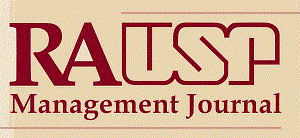Abstract
Purpose
The purpose of this study was to identify the explanatory power of the affective, cognitive and evaluative aspects of identity with work teams in predicting team effectiveness, represented by the variables: satisfaction with the team, manager-assessed team performance and objective indicators of performance.
Design/methodology/approach
Data were collected from 131 work teams of a Brazilian public organization with units in all state capitals of the country. Work team identity scale, the work team satisfaction scale, the team performance scale and objective performance indicators collected based on the achievement of the goals set for the units that make up the organization were used. To test the predictive model, three regressions were conducted using the stepwise method.
Findings
Regression analysis results showed that the evaluative dimension explains about 6% of the performance assessment given by managers, whereas the affective dimension explains 63% of the satisfaction with work teams. No significant results were found for the objective performance indicators.
Originality/value
The observed findings demonstrate the pertinence of understanding the work team identity as a collective and multidimensional phenomenon, as well as the contribution of its different components in explaining variables that represent effectiveness.
Keywords
Work team identity; Identity with work teams
